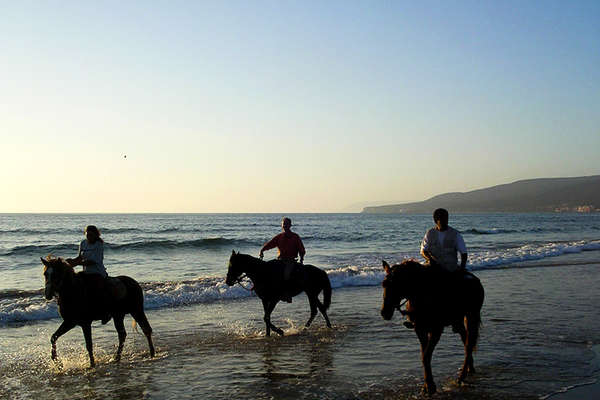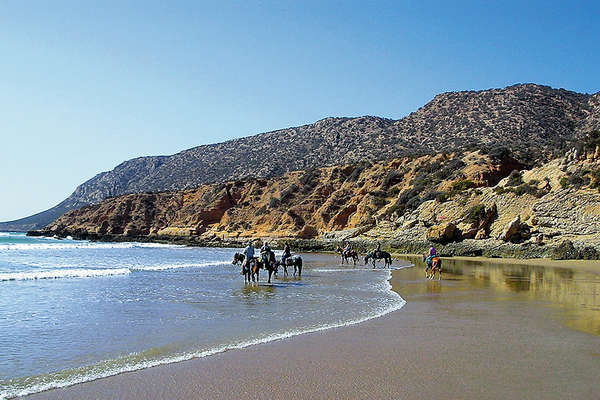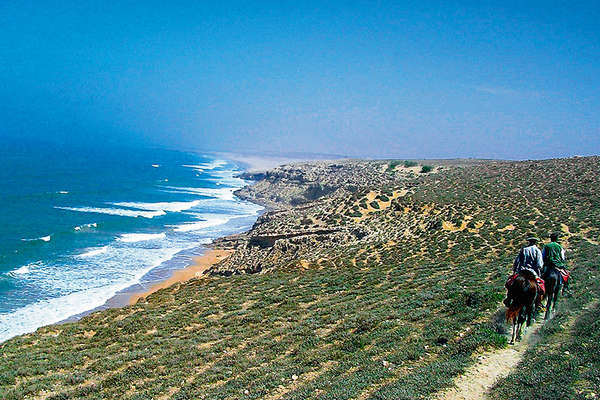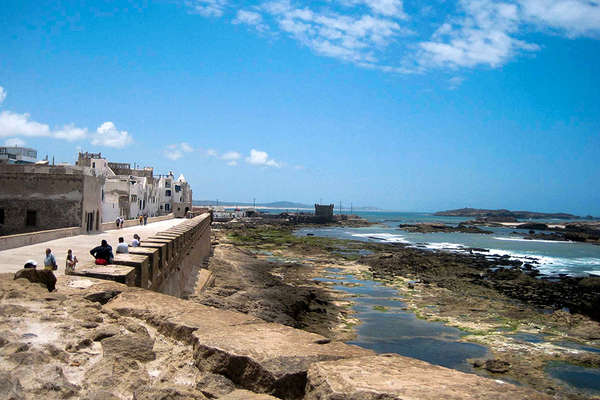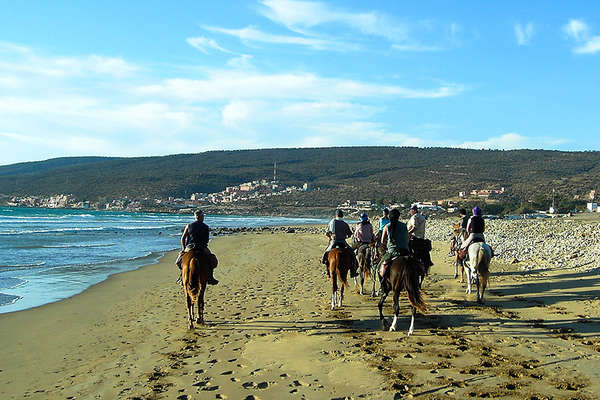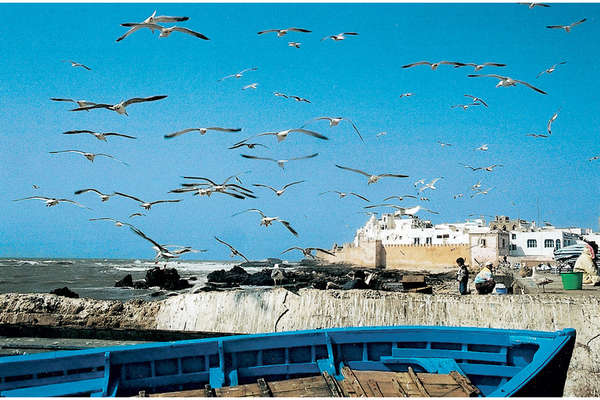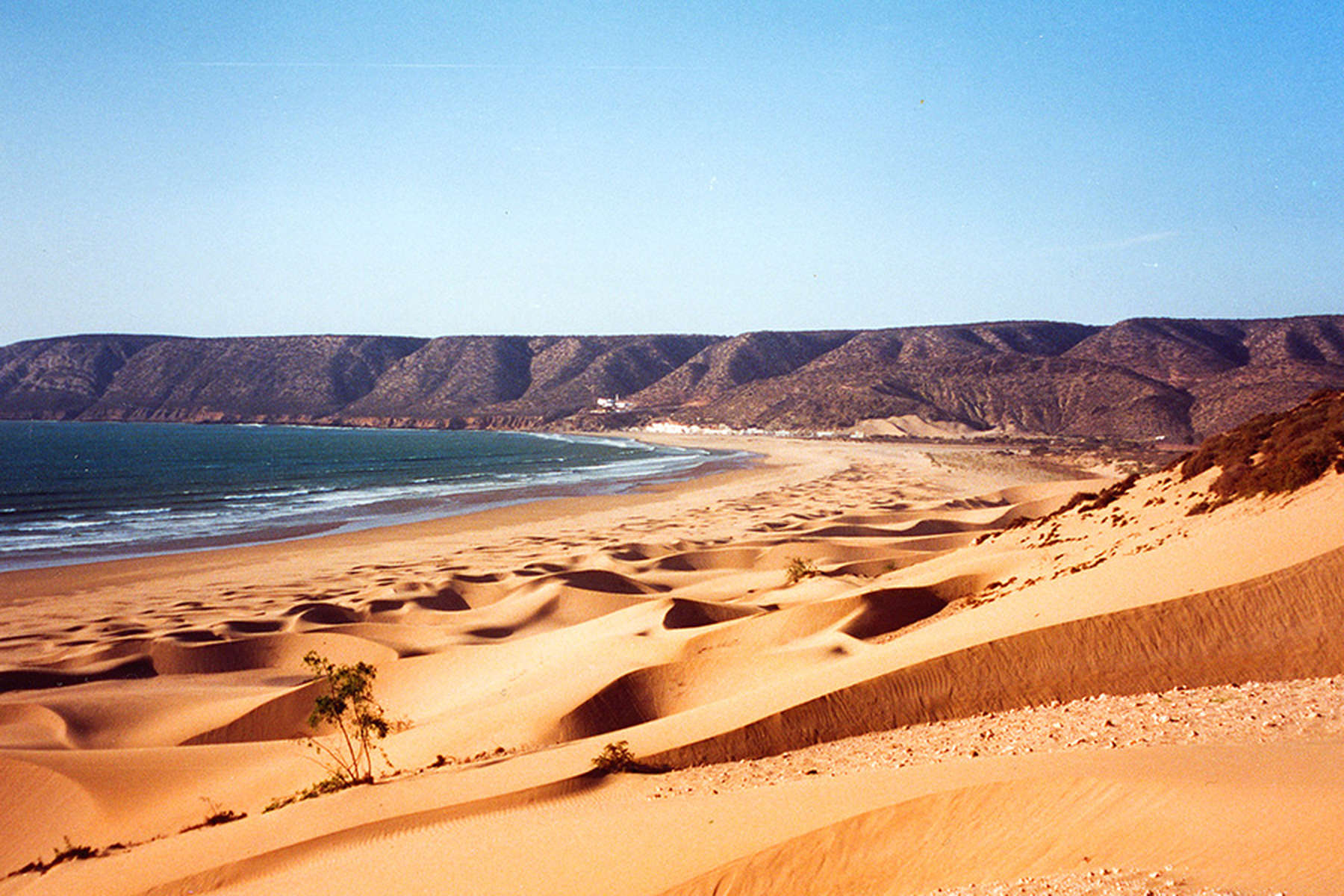
From the horse’s mouth
Itinerary
Highlights
- Temperate climate, particularly pleasant during the summer months.
- Gallops on long deserted beaches. The coastline is known for being windy so is not popular with sunbathers, meaning that the beaches are perfect for riders.
- One night in a riad in the medina of Essaouira with free time to explore the city.
- Two nights in Marrakech to discover the city and its medina
Dates & prices
Price details
- Rates are per person, based on two riders sharing a twin/double/triple room in hotels, riads and gites.
- Groups are composed of a minimum of 3 international riders and a maximum of 10 riders, plus guides.
- This ride will also confirm for 2 riders on payment of a supplement of €560 / £485 / $650. Once the group has reached 3 people, we will remove this supplement from your invoice and refund you if you have already paid it.
- There is no single supplement if you are willing to share a room with another guest of the same sex. To guarantee your own room during the nights in hotels and riads, there is a single supplement of €180 / £155 / $210. Please note, it is not possible to reserve a single room for the 3 nights in gite / guesthouse accommodation, and you must be willing to share with other riders of the same sex.
- Transfers are included to and from Marrakesh at set times, before 4:00 pm on the first day (transfer is leaving at 5:00 pm) and after 12:00 noon from Marrakech on the last day. For flights not matching the transfer times, a private transfer can be organised. Please contact us for rates.
- Certain diets may incur a supplement (gluten-free diets can be accommodated at a supplementary charge of €100 / £90 / $110 for instance, if you require specific gluten-free supplements). All dietary requirements must be specified at the time of booking.
Please Note
The itinerary may be modified at anytime for security reasons, meteorological or events beyond our control such as blocked roads, rivers in flood, drought, strikes and local holidays. Equus Journeys, our local partners and their local guides will always strive to find the best solution and will alter the itinerary as needed.
The names of the hotels and accommodation are given for information only and depending on availability, they may be modified without notice and replaced by another of a similar standard.
Price includes
Support Team
1 groom
Logistic
1 horse equipped with saddle and bridle per rider
1 vehicle and driver
Inland transports
Private bus or Landrover
Accommodation
Double/triple room in hotel standard 3/4* in Marrakech
Meals
Full board from dinner on day 1 to last breakfast on day 8
Additional equipment
Price doesn't include
Meals
Beverages at the hotel, including water, and personal extras
Transports
Extra
Extra
Insurance
Optional
Accommodation
Equestrian info
Horses
Guide & local team
Minimum riding ability
Minimum riding ability
Please note that the horses are only c. 15hh so if you weigh over 90kg or are taller than 6ft 5inches then please contact us before booking so that we can check there is a suitable mount for you.
Pace
Please note that canters are always in single file due to the fact you are riding stallions.
Tacking ability and participation
Trip conditions and Requested experience
Having previous experience of riding a trail of several days would be an advantage but it is not compulsory. Guests who do not ride regularly are requested to get fit prior to the ride. It is of particular importance to ensure you are comfortable and balanced when riding at speed across rough terrain and open spaces.
Visiting a new country offers the opportunity to meet other cultures with different mentalities, therefore it is important to accept these differences and respect the local way of life.
Equestrian equipment
Saddlebags are provided.
We recommend our riders to wear a helmet to the correct standard and you should bring your own to ensure a proper fit.
Travel info
Comfort
In Essaouira (the 2nd night and 6th night) you will stay in a riad in a twin or triple room, each with private bathroom.
For the rest of the trip (the 3rd, 4th and 5th nights) you will stay in gites or guesthouses, in shared twin or triple rooms, with a shared bathroom. Rooms will be shared with other riders of the same sex. Please bring a sleeping bag, towel and any washing essentials.
Meals
Water is provided but you should bring your own bottle.
Special diets can be accommodated, however please note that some foods can be difficult to find in Morocco. Certain diets may incur a supplement (gluten-free diets can be accommodated at a supplementary charge of €100 / £90 / $110 for instance, if you require specific gluten-free supplements). All dietary requirements must be specified at the time of booking.
Climate
Temperatures are c. 30c during the day in summer and c. 22c in spring and autumn. In winter the wind can make it feel colder,
The sea temperature is usually 20-22c between June and October.
Marrakech has a Mediterranean climate which is usually hot summers and a clear blue sky, with cold winters. The best season to visit this city is Spring/Autumn when the temperatures are pleasant all day (22-30c).
Tips
Packing list
- Equus Journeys strongly recommend that you wear a riding helmet and that you take your own to ensure a correct fit.
- Sunhat for when not riding
- Sunglasses - with a cord attached so they don't fly off when riding
- Buff or bandana
Upper body
- Long sleeved shirts provide protection from the sun and dust
- T-shirts
- Fleece, jumper or jacket - the evenings can be cold
- Waterproof jacket - the rains can be difficult to foresee and it's better to be prepared. Layering is key to cope with the fluctuations in temperature between day and night
- Casual clothes for the evening
Legs
- Lightweight, comfortable riding trousers or jodhpurs - we recommend riding in them at home before taking them on holiday to ensure they don't rub
- Shorts for lazy lunchtimes
- Casual clothes for the evening
Hands and Feet
- Comfortable riding boots. We recommend short boots with half chaps as long chaps/long boots can get very hot.
- Sandals, flip-flops or trainers for moving around the camp
- Gloves - your hands are particularly exposed to the sun whilst riding
Nightwear
- Sleeping bag
- Thermals are a good option for sleeping in, or a t-shirt and shorts for warmer nights
Our Recommendations
- Please don't take a hard sided suitcase. Your luggage should be soft sided and you should pack it into two bags if it weighs more than 15kg so it's easier for the team to transport between camps
- Take a second, smaller bag to pack things you may need during the day such as a book or sun cream then you can easily access it during the long lunch break
- We recommend travelling in your riding boots and carrying your hat and some riding clothes in your hand luggage - then if your luggage goes astray you are still able to ride!
Other useful items
- Swimsuit
- Towel. Camping towels will pack lighter and dry more easily
- Sarong (for going to/from the shower tent)
- Water bottle (1.5 litre or two x 1 litre)
- Hand sanitiser
- Wet wipes for when showers aren't possible
- Camera and high capacity memory card. Spare battery
- Bumbag for carrying your camera and small items whilst riding
- Headtorch or small torch for moving around camp at night
- Toilet paper and small plastic bags for taking rubbish away
In your luggage
- Any liquids, such as shampoo, moisturiser, deodorant over 100ml
- Small penknife
In your hand luggage
- Any valuables, such as your camera, ipod, ipad etc.
- Liquids under 100ml
- Your riding hat
- Sleeping bag
Medical kit
- Sunscreen and lip balm - must be high factor
- Insect repellent
- Any medication you regularly take
- Blister plasters in case of any rubs
- Antiseptic cream, plasters, aspirin, anti-histamine, insect-bite salve etc...
- Rehydration sachets (dioralyte or similar)
- Spare prescription glasses/contact lenses
- Ear plugs, particularly if you are a light sleeper
- Micropur or similar water purification tablets
Sustainable tourism
- Travel light. It's a little known fact, but the lighter you pack, the better for the environment as heavy bags will produce higher emissions (when flying a plane or driving a car!).
- Reduce plastic waste. Take your favorite reusable bottle with you. Avoid single-use bags, cups, or straws.
- Preserve nature. Always take your rubbish with you during the ride and recycle them. Leave all the flowers or plants as you found them, and never get too close when observing wildlife. Make sure to use eco-friendly products such as body wash or laundry detergent (if camping) to protect both your skin and the environment.
- Choose your experiences carefully. Respect animal life by not participating in any activities that abuse wild animals (shows, elephant rides, etc.).
- Support local populations. Buy local handicrafts, be respectful of customs, and learn about the culture of local communities.
- Share! Raise awareness among your family and friends about sustainable tourism.
Did you know?
Did you know?
During this horseback trail in Essaouira, Morocco you will ride through forests of Argan trees.
The Argan tree is endemic to the semi-desert valleys of Morocco and Algeria and grows up to 8-10metres and can live for 150-200 years. They are thorny with gnarled trunks and small oval leaves. The fruits contain a very hard nut which protects one (and occasionally two or three) small, oil-rich seeds and takes over a year to mature, ripening in the June/July of the following year.
The fruits are harvested once they've fallen and the hard nuts are cracked by hand between two stones to released the seeds. After roasting the seeds they are ground to a paste and then squeezed by hand to extract the oil. This labour-intensive production of Argan oil makes it a luxury item in Morocco.
Argan trees are in decline and their area has decreased by half over the last 100 years. Goats are often seen climbing in the trees, eating their leaves and fruit, which also stunts their growth. The wealth generated by the Argan oil industry has meant that locals can afford to buy more goats, which further destroys the trees. The hard nuts are so resilient that the kernals are collected even after they have passed through the goats, so that they can be cracked open to release the seeds!
You will see many of these trees (and climbing goats!) on your trail ride. Of course, you will also have the opportunity to ride along the beach, which is a memorable experience!
On the blog
Read more: https://blog.equus-journeys.com/en/post/4/discover-the-barb-horse

